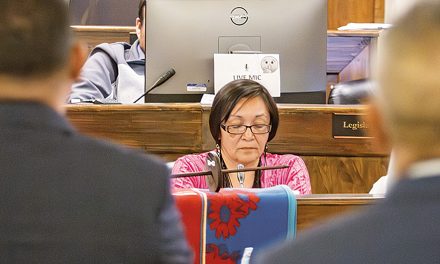
Families left high and dry: Frontier files for bankruptcy after promising internet connections
CHINLE
Elvira Dennison thinks of herself as a pretty tech-savvy mom.
As a mentor for families of children with health problems, she knew how to Zoom before it became a necessity, and she was already working mostly from her home in Tohatchi, New Mexico, when the pandemic hit.
She and her two children have internet-capable devices.
“When the (Central Consolidated) school district sent out a survey asking if we were prepared for online learning, my answer was yes,” she recalled. “We had devices, and we had internet.”
In reality, “I wasn’t prepared,” she admitted. “Not at all.”
The family’s internet connection wasn’t strong enough for her and both her children to be online at the same time.
She tried driving the kids to the hotspot at one of the schools, but her fifth-grader got fidgety and uncomfortable sitting in the car all day. She bought a hotspot, but went through a week’s worth of data in three days when the kids were on Zoom classes.
“I was spending $80 to $90 a month on top of what the equipment cost,” she said.
Last March, the nonprofit she works for, Navajo Family Voices, announced it would fund six months of Frontier Communications broadband service for 60 area families who had kids in school and were having trouble getting connectivity. Dennison applied and was selected.
“I thought my problems were over,” she said.
But after nearly a year with no connection, she’s given up.
When CCSD announced last month they would start in-person learning for students whose parents approved, she sent her kids back to school.
“It’s a little bit scary, because my youngest has asthma,” she said, a complication that can make COVID-19 more severe. “But I didn’t know what else to do. He wasn’t learning.”
Ryan, Dennison’s fifth-grader, confirmed he wanted to go back.
“My grades were slipping,” he said “I couldn’t get online at home. I spent most of the day sleeping.”
According to Josey Foo, executive director of Navajo Family Voices, Dennison is not alone. Of the 60 families identified to get cable internet, only six were served before Frontier announced it was capping connections across the entire Navajo Nation.
“It’s very disheartening,” she said.
NFV had been excited about the new program.
“Frontier gave us a great rate, about half-price,” she said. “We worked with them to get the equipment. Our staff installed it. We did all this and then Frontier disappeared.”
Perhaps “disappeared” is too strong a word.
“We had dozens of meetings,” Foo said. “The date kept getting pushed back (for a solution).”
In May or June, after hearing from a rival company Frontier was in bankruptcy proceedings, Foo called them up.
After Foo confronted them, she said, the company representatives admitted Frontier had been restructuring after filing for Chapter 11 protection last April — something it had neglected to mention when it agreed to provide the new connections.
As part of the bankruptcy settlement, Frontier had agreed to cut $10 billion in debt. Without the capacity to build new infrastructure, they said, they had no choice but to cap connections. But, they said, they were working on a solution.
When 2021 rolled around and NFV was still stuck at six families, Foo asked for a meeting with someone who could update her on the status.
Helena Viramontes, enterprise customer service representative with Frontier, agreed to a Zoom with Foo, Dennison, and Joel Balasuit, a school counselor for CCSD in February.
Viramontes reiterated the problem: “It’s completely all congested. We’re not going to be able to add services, change services or add broadband.”
What they could do, she said, was to try a series of “one-gig e-links,” which she described as a way of rerouting some of the internet traffic to open up more capacity.
“What are these one-gig e-links?” Foo can be heard asking on the Zoom recording.
“That’s way beyond my understanding,” Viramontes replies. “It’s their (engineers’) attempt to remove the cap and … open it up.”
She then said she would have a report on the success of the fix by March 26 — by which time CCSD will be on its last quarter of the school year.
“Last time you said January first,” Foo protested. “I have a feeling we have to put our heads together and figure something out. It’s really disheartening.”
Viramontes replied that there’s nothing else to be done.
“Once an area is capped,” she said, “you’re just going to come up against the same reason: capped, capped, capped.”
Viramontes did not respond to an email or a phone call by press time asking if she had an update.
In retrospect, Foo said, NFV probably should have shopped around before making the agreement with Frontier. But “we don’t exactly have a lot of choices out here,” she said.
There was at least one other choice — the tribal enterprise NTUA Choice Wireless. Choice Deputy General Manager Velena Tsosie said she had not heard about the agreement with Frontier but Choice would have been glad to help — and still would.
“We would be very glad to step in and provide broadband to any/all families that are in our coverage area at reduced monthly rates,” Tsosie wrote in an email to the Times. “During this pandemic, we have and are providing broadband to well over 1,000 families that have students at home doing distance learning.”
Foo said NFV has found other ways to help the families, including stipends for child care and delivering COVID-19 supplies, but she fears children like Dennison’s have lost a lot of ground they may not be able to recover when it comes to their schooling.
But as a single mom living on the reservation, Dennison said she’s learned to take things in stride.
“Things move slow here,” she shrugged. “That’s the way it is. I’m just grateful enough people have been vaccinated that I feel O.K. about sending my kids back to school.
“Their lives have changed drastically because of the pandemic, and now they’re changing again,” she added. “We’re all just trying to adjust.”








 Highway 264,
Highway 264, I-40, WB @ Winslow
I-40, WB @ Winslow